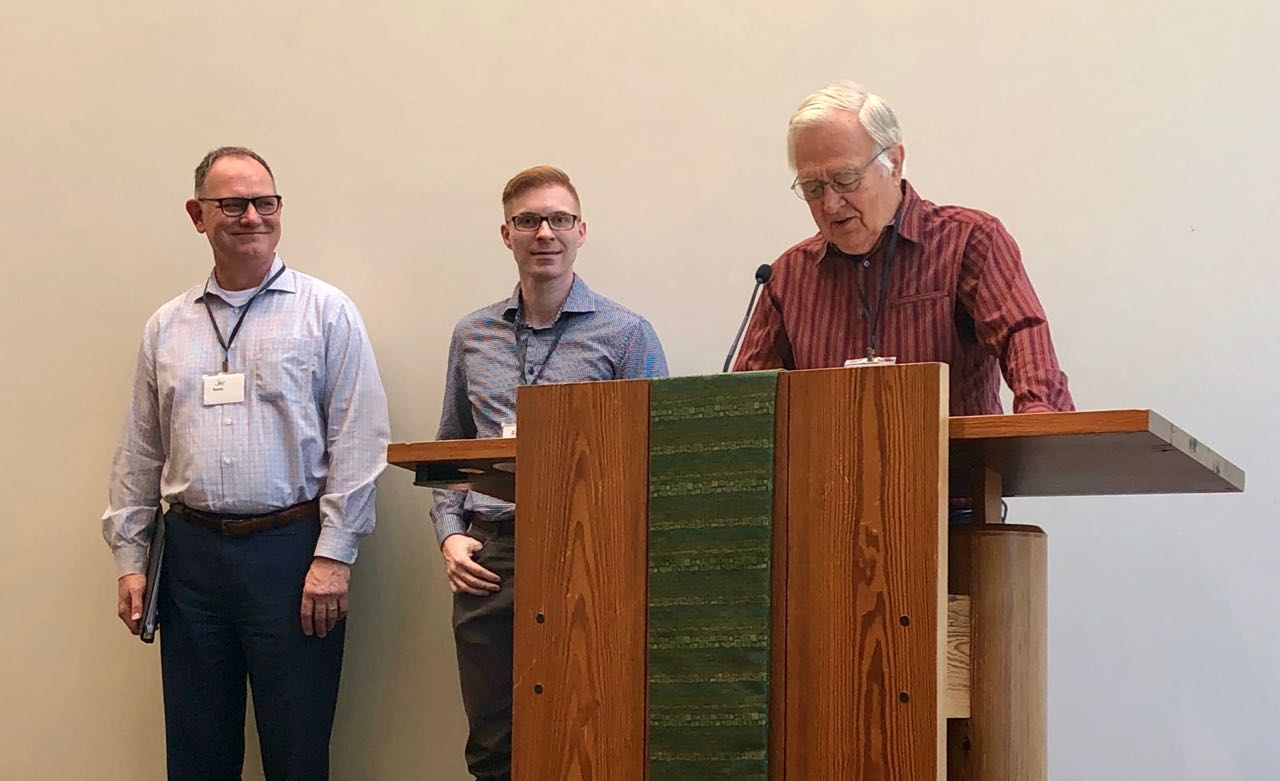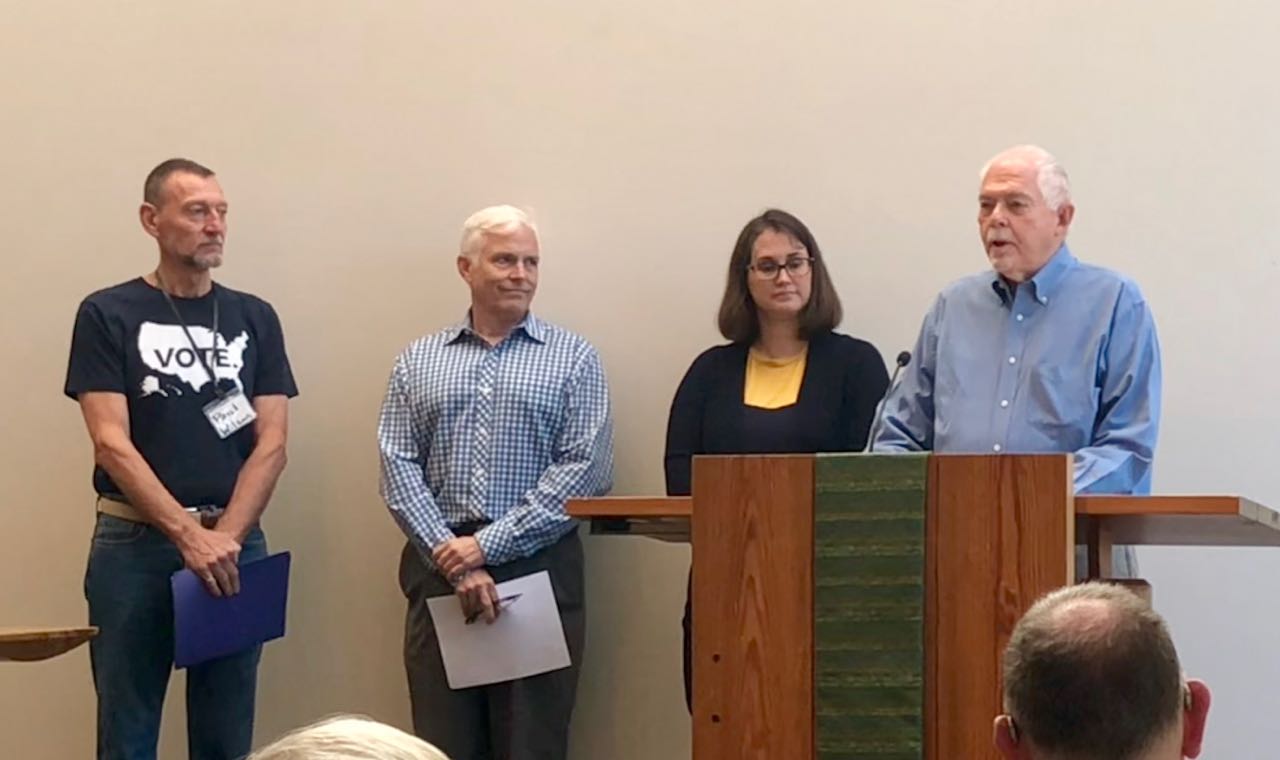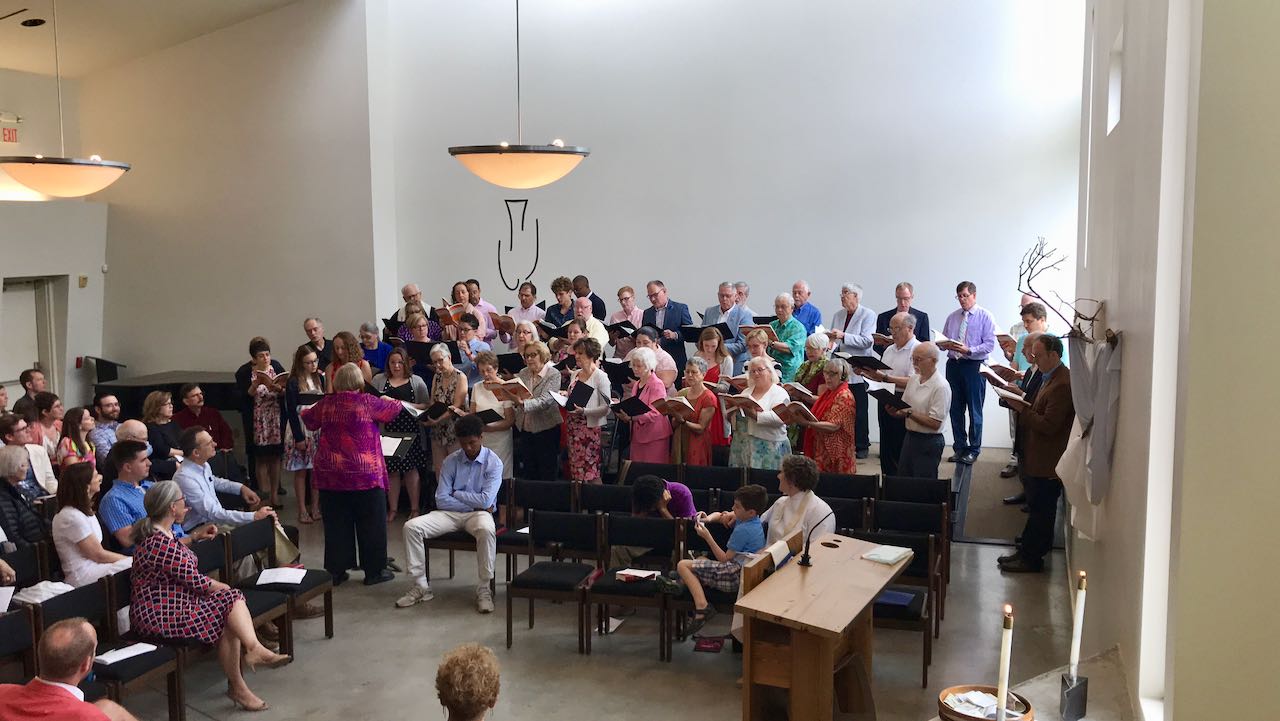| Our church body. The scripture lesson for this Sunday, October 28, was 1 Corinthians 12. The meditations were offered by a representative from each committee. They shared a specific expanding vision for our expanded space. #TheseAreOurSacredStories |
|
0 Comments
This is the full text version of Laura Mayo's scripture reading and sermon from Sunday, September 30; diving into the larger biblical story of Queen Esther and Vashti. A story of sexual exploitation and silence.
Scripture Reading: Our lectionary reading this morning is Esther 7:1-6, 9-10, 9:20-22 but I am not going to read that passage. The lection tells of Esther giving a second party for the king and the king’s second in command, Haman. Esther reveals not only that she is a Jew but also that Haman has ordered all the Jews murdered. The king is outraged with Haman and decides he should be put to death on the gallows Haman had built for his enemy, and Esther’s cousin, Mordecai. To ensure that we know this is a happy ending, the lection concludes with Mordecai sending letters to all the Jews in all the provinces of the king telling them to make it a holiday to be celebrated each year with feasting and gladness and sending gifts of food to one another and presents to the poor. The problem is not with this passage, it is the fact this is the only reading in the entire lectionary from the book of Esther. In a three-year cycle with at least 4 readings for each day of each year, the only passage from Esther comes from chapters 7 and 9. This morning, we will read from chapters 1 and 2: This happened in the days of Ahasuerus, the same Ahasuerus who ruled over one hundred and twenty-seven provinces from India to Ethiopia. 2In those days when King Ahasuerus sat on his royal throne in the citadel of Susa, in the third year of his reign, he gave a banquet for all his officials and ministers. The army of Persia and Media and the nobles and governors of the provinces were present, 4while he displayed the great wealth of his kingdom and the splendor and pomp of his majesty for many days, one hundred and eighty days in all. When these days were completed, the king gave for all the people present . . . a banquet lasting for seven days, in the court of the garden of the king’s palace. Drinks were served in golden goblets, goblets of different kinds, and the royal wine was lavished in accordance with the bounty of the king. Drinking was by flagons, without restraint; for the king had given orders to all the officials of his palace to do as each one desired. Furthermore, Queen Vashti gave a banquet for the women in the palace of King Ahasuerus. On the seventh day, when the king was merry with wine, he commanded . . . seven eunuchs who attended him, to bring Queen Vashti before the king, wearing the royal crown, in order to show the peoples and the officials her beauty; for she was fair to behold. But Queen Vashti refused to come at the king’s command conveyed by the eunuchs. At this the king was enraged, and his anger burned within him. Then the king consulted the sages who knew the laws . . . ‘According to the law, what is to be done to Queen Vashti because she has not performed the command of King Ahasuerus conveyed by the eunuchs?’ Then his advisor said, ‘Not only has Queen Vashti done wrong to the king, but also to all the officials and all the peoples who are in all the provinces of King Ahasuerus. For this deed of the queen will be made known to all women, causing them to look with contempt on their husbands, since they will say, “King Ahasuerus commanded Queen Vashti to be brought before him, and she did not come.” This very day the noble ladies of Persia and Media who have heard of the queen’s behavior will rebel against the king’s officials, and there will be no end of contempt and wrath! If it pleases the king, let a royal order go out from him, and let it be written among the laws of the Persians and the Medes so that it may not be altered, that Vashti is never again to come before King Ahasuerus; and let the king give her royal position to another who is better than she. So, when the decree made by the king is proclaimed throughout all his kingdom, vast as it is, all women will give honor to their husbands, high and low alike.’ This advice pleased the king and the officials, and the king did as proposed; he sent letters to all the royal provinces, to every province in its own script and to every people in its own language, declaring that every man should be master in his own house. After these things, when the anger of King Ahasuerus had abated, he remembered Vashti and what she had done and what had been decreed against her. Then the king’s servants who attended him said, ‘Let beautiful young virgins be sought out for the king. And let the king appoint commissioners in all the provinces of his kingdom to gather all the beautiful young virgins to the harem in Susa; let their cosmetic treatments be given them. And let the girl who pleases the king be queen instead of Vashti.’ This pleased the king, and he did so. Now there was a Jew in the citadel of Susa whose name was Mordecai son of Jair son of Shimei son of Kish, a Benjaminite. Kish had been carried away from Jerusalem among the captives carried away with King Jeconiah of Judah, whom King Nebuchadnezzar of Babylon had carried away. Mordecai had brought up Hadassah, that is Esther, his cousin, for she had neither father nor mother; the girl was fair and beautiful, and when her father and her mother died, Mordecai adopted her as his own daughter. So when the king’s order and his edict were proclaimed, and when many young women were gathered in Susa, Esther also was taken into the king’s palace and Esther did not reveal her people or kindred, for Mordecai had charged her not to tell. Every day Mordecai would walk around in front of the court of the harem, to learn how Esther was and how she fared. The turn came for each girl to go in to King Ahasuerus, after being twelve months under the regulations for the women, since this was the regular period of their cosmetic treatment, six months with oil of myrrh and six months with perfumes and cosmetics for women. When the girl went in to the king she was given whatever she asked for to take with her from the harem to the king’s palace. In the evening she went in; then in the morning she came back to the second harem; she did not go in to the king again, unless the king delighted in her and she was summoned by name. When the turn came for Esther, to go in to the king, she . . . was admired by all who saw her. When Esther was taken to King Ahasuerus . . . the king loved Esther more than all the other women; of all the virgins she won his favor and devotion, so that he set the royal crown on her head and made her queen instead of Vashti. Then the king gave a great banquet to all his officials and ministers—‘Esther’s banquet.’ He also granted a holiday to the provinces, and gave gifts with royal liberality. These are our sacred stories. Thanks be to God. Sermon: This week in most churches neither Vashti nor Esther will get to tell their stories. The lectionary left their abuse and exploitation, not for another Sunday, not for a weekday, but out all-together. As a person who grew up in churches that did not use the lectionary, let me assure you, that in my experiences, Vashti and Esther don’t get a full hearing in those churches either. These stories matter. How we read them matters. That we hear them matters. The man in the highest position of power, as full of himself as he was of wine, wanted to show off what he saw as his prized possession, his wife, Vashti. He summons her and requires that she wear her crown, the implication being only her crown. It does not take seven eunuchs to summon someone unless there is a reason to expect she will not want to go. Vashti refuses to be sexually exploited. She says no. When Vashti refuses to come, King Ahasuerus calls together his advisors to ask what ought to be done. Not only has Vashti defied the king, she has set an example for other women. The king’s advisors say, “This very day the noble ladies of Persia and Media who have heard of the queen’s behavior will rebel against the king’s officials, and there will be no end of contempt and wrath!” And so, the men, denied the opportunity to objectify Queen Vashti, decide to make Vashti an object lesson. They are denied their chance to see her stripped body and so they strip her of her crown and her voice. Vashti is silenced and the men shout: this is what will happen if you stand up for your dignity, for your body, for your choices. Vashti refused to be objectified and she is silenced and replaced. This is true not only in the biblical story but also in the church. The church has silenced Vashti’s “no.” We’ve closed our ears and our mouths. Vashti says no to a man in power. Maybe her story has been left out of the common discourse of the church because church leadership has not wanted us to consider a world where women, boys, men, and girls say no when power demands they be exploited and abused; no when power tries to take; no! Dr. Anna Carter Florence writes, “I wonder what would happen if we put the story of Vashti back into circulation. Would our children have a role model for saying no to adults who try to molest or harm them? Would our daughters muster a little more courage for saying no to a boyfriend who keeps pressuring them to have sex when they don't want to? Would it give you and me a place to begin talking about the hundreds of awkward, troubling moments in our lives when we feel like we are being asked to do something that puts our integrity at risk?” We can hear Vashti’s story because, while the church may have tried to ignore it, it lives on in the Bible, it is one of our sacred stories (thanks be to God). What the men in power meant for silence, what the church has often ignored, lives in the sacred scriptures, ready in each generation to be heard. Vashti cannot be erased. There are echoes of her “no” to abusive power, her “no” to sexual exploitation reverberating throughout the Bible especially in the stories of the women who are taken, who are abused, who are neglected, who have neither voice nor opportunity to say their own no. Esther is such a woman. Vashti is no longer queen. The king wants a new queen: ‘Let beautiful young virgins be sought out for the king. And let the king appoint commissioners in all the provinces of his kingdom to gather all the beautiful young virgins to the harem in Susa; let their cosmetic treatments be given them. And let the girl who pleases the king be queen instead of Vashti.’ So, when the king’s order and his edict were proclaimed, and when many young women were gathered in Susa, Esther also was taken into the king’s palace. Like countless others, these young women were trafficked across borders away from their homes and then they were in turn assaulted; they were raped. “The turn came for each girl to go in to King Ahasuerus . . .4In the evening she went in; then in the morning she came back to the second harem; she did not go in to the king again, unless the king delighted in her and she was summoned by name.” It matters how we interpret and explain stories of faith. Stories from our Biblical text are woven into the fabric of our lives and often inform our thoughts about worth, value - about love. Have you ever heard this part of Esther’s story? I imagine that if we know anything about Esther, if we’ve heard any part of her story in church, we’ve heard, not Esther’s voice but Mordecai's: “Do not think that in the king’s palace you will escape any more than all the other Jews. For if you keep silence at such a time as this, relief and deliverance will rise for the Jews from another quarter, but you and your father’s family will perish. Who knows? Perhaps you have come to royal dignity for just such a time as this.” Esther. But that’s not even her name, that’s her Persian name, the name they gave her so the teacher could pronounce it. Her name, her Hebrew name, is Hadassah. Power and privilege name her Esther and refuse her her Hebrew name even in the Hebrew Bible where her book is called Esther. Her name is Hadassah. Hadassah has been sexually exploited; she hides her identity as a Jew, and then when all the Jews are threatened, her cousin entreats her to break her silence. What happens when women break their silences? We know what happened to Vashti. We know what happened to the women who came to the tomb that Sunday morning long ago - the women who were the first to experience resurrection: “When they came back from the tomb, the women told all these things to the Eleven and to all the others. . . But they did not believe the women” (Luke 24:9-10). The resurrection story is met with men who reject the testimony of the women. Nevertheless, the women - courageous women, willing to bear witness to their experience regardless of the consequences or the social scripts that would render them silent - the women persisted. Persia is no longer the largest empire. The time of Jesus and the disciples has come and gone and yet here and now women are demeaned and devalued: our words and our bodies - our stories are dismissed and disregarded. This week “we have watched as survivors have been re-victimized for their decision to speak truth to power, and those same old demonic scripts keep trying to seize the story. Women should remain silent. Boys will be boys. She probably deserved it. We were just messing around. She never said no. This could ruin his life.” Your stories are yours and yours alone to share (or not share) in your time, on your terms. But know this day that you are not alone. 1 in 3 women have experienced sexual assault, as well as 1 in 6 men. A large percentage of these victims remain silent and this week has provided far too much evidence for why silence seems the lesser of two evils for so many survivors. Your story is your story and whatever it is, it is not your fault, not your shame, not your mistake. If you want to share your story, you are safe here. I hear you. I believe you. I am on your side. Stories harness power. When we teach our children and our youth to identify harmful systems of abuse in our Biblical texts, we help them recognize and call out injustices in their current realities. Erika Hewitt in “The Dynamics of Silence,” proclaims, “We're unraveling silence because we have determined that our power with one another is greater than the power someone once had over us.” There is power in solidarity - power with one another - hearing and believing. The church must do better to unravel silence. We will do better. We start by hearing and believing the women of the Bible. We start by calling out places of oppression when we see them. We start by talking about misogyny, sexual exploitation and abuse. We start by having conversations about harmful views of what it means to be a boy or a man in the world. We start by discussing harmful views of what it means to be a girl or a woman in our world. I thought we were going to talk about Hadassah Esther as an immigrant. I thought we were going to talk about her willingness to go to the king even though it might mean her death and plead for the lives of her people. I thought we were going to ask ourselves what risks we need to take. And all that’s here: Hadassah’s story is an immigrant story. But it is also a survivor’s story. It is a story, along with Vashti’s, that we need to tell and we need to hear. The church has for so long now been part of the silencing, part of systemic exploitation. For too long we have been responsible for perpetuating generations of abuse, patriarchy, and the mistreatment of women. How we tell and interpret our sacred stories influences how we perceive God and how we treat one another. For too long, if the church has told the story of Hadassah Esther at all it has told it only in part - it has exploited her all over again by bringing her out and parading her around in her crown - Vashti refused such treatment by the King but the church has done this to Esther for centuries. We place Esther on the felt board and tell our girls to be brave like Esther - and God knows she was brave - but we don’t tell those girls what actually happened to Esther. We don’t tell those boys either. We exploit Esther’s story without fully telling it. Hadassah Esther is a victim’s account, a survivor’s account of human sex trafficking and rape. It is time to hear the stories and to believe them. It is past time. Now is the time, for people of faith to call out injustices and structures of exploitation and abuse. To call them out in our sacred stories and to call them out in the world. Change is possible. I still believe love wins. Arundhati Roy says: “Another world is not only possible, she is on her way. On a quiet day, I can hear her breathing.” Amen. by Rev. Laura Mayo
|
Covenantan ecumenical liberal baptist congregation Categories
All
Links to Member's Blogs:
Archives
July 2021
|






 RSS Feed
RSS Feed
